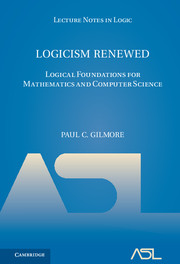Preface
Published online by Cambridge University Press: 30 March 2017
Summary
Logicism, as described by Russell in the preface to the first edition of his Principles of Mathematics, is the thesis
… that all pure mathematics deals exclusively with concepts definable in terms of a very small number of fundamental logical concepts, and that all its propositions are deducible from a very small number of fundamental logical principles …
In the introduction to the second edition of Principles of Mathematics [126], Russell reviewed the material presented in the first edition and described how some of the views presented there had been modified by his own and others’ work. He concluded the introduction with the following
The changes in philosophy which seem to me to be called for are partly due to the technical advances of mathematical logic in the intervening thirty-four years, which have simplified the apparatus of primitive ideas and propositions, and have swept away many apparent entities, such as classes, points, and instants. Broadly, the result is an outlook which is less Platonic, or less realist in the medieval sense of the word. How far it is possible to go in the direction of nominalism remains, to my mind, an unsolved question, but one which, whether completely solvable or not, can only be adequately investigated by means of mathematical logic.
A nominalist related view of logic and mathematics was expressed by Ayer in Chapter IV of [11]:
… the truths of logic and mathematics are analytic propositions
… we say that a proposition is analytic when its validity depends solely on the definitions of the symbols it contains.
To pursue this thesis more carefully it is necessary to distinguish between what Frege has called the sense of a symbol and its nominatum or what Carnap [24] has called the intension of a symbol and its extension. For “the definitions of the symbols” must be understood to mean the definitions of their intensions.
- Type
- Chapter
- Information
- Logicism RenewedLogical Foundations for Mathematics and Computer Science, pp. ix - xviiiPublisher: Cambridge University PressPrint publication year: 2005



